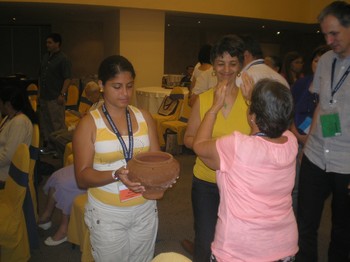The ecumenical movement frequently uses the imagery of a boat, Latin American Council of Churches (CLAI) General Secretary Nilton Giese told the organization’s sixth General Assembly here May 24.
Framing his report around Luke 8 ― about Jesus and his disciples in a storm-tossed boat ― Giese admitted that “in the last six years, the CLAI boat had terrible storms.”
The election of a new governing board is being intensely watched here after conflicts following the fifth General Assembly in 2007 in Buenos Aires resulted just a year later in the resignation of five of the 11 board members and the previous general secretary, Israel Batista. The fallout included court-ordered severance payments to 10 CLAI officials totaling $190,000.
Giese, a Brazilian Lutheran, added, “But there was no money. Supporting organizations in the U.S. and Europe were dismayed, wondering, ‘What happened to CLAI?’ They were supportive of our problems but refused to pay the severance and told us winds of change ― their own financial crises ― were blowing in the North. This further damaged our financial situation.”
Giese and the newly elected CLAI president, Episcopal Bishop Julio Murray of Panama, made the rounds of CLAI member churches “to see what we should be doing.” Giese said, “We were dismayed to find that many didn’t know what CLAI was doing and that it was far removed from the churches.”
So in 2009, with help from a Swedish church, CLAI embarked on a thorough evaluation of its mission and activities. The evaluation showed, Giese said, “that CLAI functioned more like an NGO ― we had a financial and administrative witness but were not functioning like a communion of churches. So we set about to redefine CLAI at its original purpose: a body of churches, not a grant-making machine.”
CLAI established “national dialogue tables” of member churches in each country to foster cooperation of churches,” Giese reported. CLAI programs have been revised to align with the feedback received from the dialogue tables.
Though some churches are more than 20 years in arrears in paying their membership contributions and attendance at this sixth General Assembly has fallen short of 2007 figures for the fifth Assembly, “we have received more participation in funding and participation in CLAI efforts,” Giese said.
“Our purpose,” he continued, “is to be a communion of churches, to strengthen our national roundtables, and to develop ecumenism at the grassroots with concrete actions, such as the accompaniment program in Colombia.”
Giese said, “CLAI is still trusted as a place to come together from different political perspectives, so we are positioned to address peace and justice, globalization and environmental justice, development inequality and human rights.”
To do so, he said, “We need a permanent process of ecumenical training in our member countries, to make visible the rights and claims of our indigenous peoples and to strengthen our relationships with them, and to create a space where young people can discuss the issues important to them without the imposing presence of adults.”
Giese concluded that “with this report we are able to say that Jesus has led us to the other side of the lake. God has permitted us to celebrate our deliverance from this storm and at the same time is challenging us for the future. God has thrust this moment into our hands and given us a mission to embrace an ecumenism backed by concrete actions” ― a reference to the Assembly theme: “Affirming one ecumenism in concrete actions.”
There is much work to do. After Giese’s presentation, a group of about 20 young people who participated in a pre-Assembly consultation on sexual and reproductive health gathered in a circle in front of the podium and excoriated CLAI for its lack of youth inclusion in the voting Assembly.
“We lament the nil participation of youth in the delegations that are attending this Assembly,” said the group’s spokeswoman, a Cuban. “If it had not been for the [youth pre-conference] there would be NO youth presence at this Assembly. We can do so much. It’s sad to see the two-faced discourse here.”
The demonstration concluded with a plea, subsequently supported by many of the delegates: “Please, do not discount our views. We want equality.”

